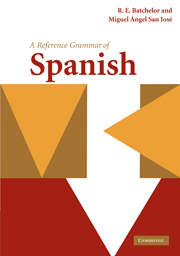Book contents
- Frontmatter
- Contents
- Preface/Prólogo
- Acknowledgments/Agradecimientos
- Abbreviations/Abreviaturas
- Introduction to the Spanish language/Introducción a la lengua española
- Part I
- Part II
- Part III
- Part IV
- Part V
- 56 Personal pronouns/Pronombres personales
- 57 Possessive adjectives and possessive pronouns, and usage with parts of the body and clothes/Adjetivos y pronombres posesivos, y uso con partes del cuerpo y ropa
- 58 Relative pronouns/Pronombres relativos
- 59 Interrogative pronouns and adverbs/Pronombres y adverbios interrogativos
- Part VI
- Part VII
- Part VIII
- Part IX
- Part X
- Appendix I Verb tables/ Tablas de verbos
- Appendix II Glossary/Glosario
- Bibliography/Bibliografía
- General index/Índice general
- Subjunctive index/Índice del subjuntivo
59 - Interrogative pronouns and adverbs/Pronombres y adverbios interrogativos
from Part V
Published online by Cambridge University Press: 05 June 2012
- Frontmatter
- Contents
- Preface/Prólogo
- Acknowledgments/Agradecimientos
- Abbreviations/Abreviaturas
- Introduction to the Spanish language/Introducción a la lengua española
- Part I
- Part II
- Part III
- Part IV
- Part V
- 56 Personal pronouns/Pronombres personales
- 57 Possessive adjectives and possessive pronouns, and usage with parts of the body and clothes/Adjetivos y pronombres posesivos, y uso con partes del cuerpo y ropa
- 58 Relative pronouns/Pronombres relativos
- 59 Interrogative pronouns and adverbs/Pronombres y adverbios interrogativos
- Part VI
- Part VII
- Part VIII
- Part IX
- Part X
- Appendix I Verb tables/ Tablas de verbos
- Appendix II Glossary/Glosario
- Bibliography/Bibliografía
- General index/Índice general
- Subjunctive index/Índice del subjuntivo
Summary
Here is a passage about the uncertainties of married life. The husband is criticized for his paunch and his bald head. The use of interrogative pronouns and adverbs is illustrated.
¿Qué es la vida, sino un cúmulo de sorpresas? ¿Quién se lo podía imaginar aquel día? Yo, inocente de mí, pregunté anhelante (anxious): “¿Me quieres?” Ella me contestó: “¿Y tú a mí?” ¿Cómo no quedar sorprendido? ¿Cuál sería la razón para que me contestara con otra pregunta? ¿Quién sabe lo que pasa por sus cabezas? ¡Ah… mujeres…!
Ya casado, me fui acostumbrando. Yo decía: “¿Qué deseas, amor mío?” o “¿Dónde vamos a cenar hoy?” Las respuestas podían ser de este tenor (type): “¿Dónde has estado?” “¿Con quién has vuelto del trabajo?” “¿Por qué no me has llamado en toda la mañana?”
Poco a poco, fue cediendo el interrogatorio. Yo estaba convencido de que había ganado su confianza, hasta que ayer capté su mirada evaluadora, como diciendo: “¿Dónde, o con quién va a ir éste, con ese enorme estómago y su hermosa calva (bald head)?” ¿Verdad que es decepcionante (disappointing)?
Forming the interrogative
A question is regularly formed in Spanish by placing the verb before its subject:
¿Hablo yo? (Do I speak?)
¿Hablas tú?/¿Hablás (A) tú? (Do you speak?)
¿Habla él/ella/ Ud.? (Does [s]he/do you speak?)
¿Hablamos nosotros/as? (Do we speak?)
¿Habláis vosotros/as? (Do you speak?)
¿Hablan ellos/ellas/Uds.? (Do they/you speak?)
[…]
- Type
- Chapter
- Information
- A Reference Grammar of Spanish , pp. 327 - 330Publisher: Cambridge University PressPrint publication year: 2010



